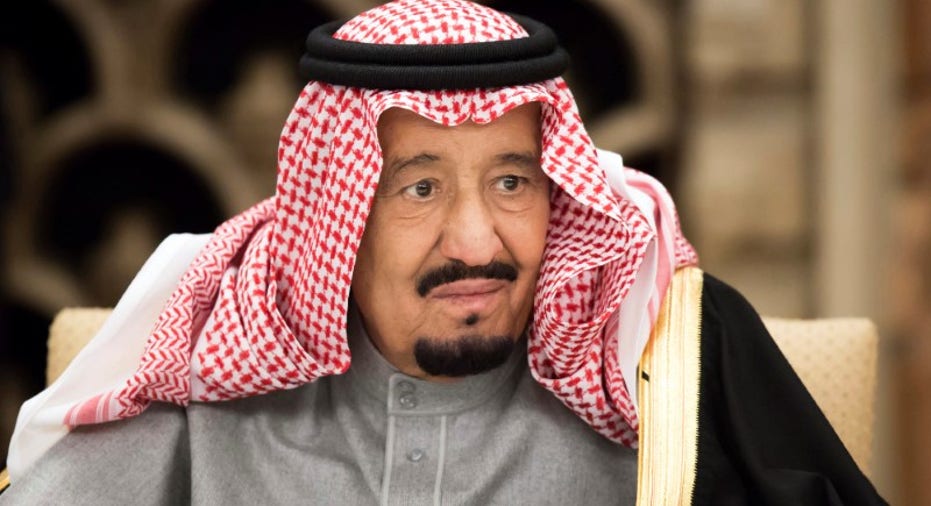Saudi Arabia hosts top investors as Aramco IPO, economic agenda remain variable

Saudi Arabia is hosting a financial summit this week, aimed at attracting investments as part of a broader effort to diversify its economy by reducing its reliance on oil revenue.
A bevy of high-profile investors and corporate bigwigs traveled to the country for what is being called “Davos in the desert.” Among them are venture capitalist Peter Thiel, Dow Chemical CEO Andrew Liveris, BlackRock CEO Larry Fink and SoftBank CEO Masayoshi Son. Saudi Arabia is looking to arouse the interest of foreign investors in its Public Investment Fund (PIF), a centerpiece of its initiative to modernize the kingdom’s economy. The comprehensive plan, known as Vision 2030, was laid out in April by the country’s leaders and involves transferring 5% of state-owned Saudi Aramco to the investment fund through an initial public offering, expected to be the largest in history.
The Aramco IPO could attract a $2 trillion valuation. The kingdom is expecting to raise $100 billion to invest in companies around the world. The idea is that revenue generated from these investments can be used to sustain its budget even when oil prices, or supply, are low, Amy Myers Jaffe, David M. Rubenstein senior fellow for energy and the environment at the Center on Foreign Relations, told FOX Business.
The Middle Eastern country, also the United States’ single greatest regional ally in the fight against terror, has recently shown an increasing interest in U.S. investments. The PIF invested $3.5 billion in ride-sharing company Uber last year, while Saudi investment in U.S. bonds reached a one-year high of $114.4 billion at the end of March, up noticeably from a low in September of $89.4 billion. President Donald Trump visited the kingdom in May, where he announced a $110 billion arms sale to the country.
However, in addition to investing in other countries, the kingdom also hopes to serve as a destination for investors.
“The Saudi government … hopes to attract new investments in areas like health care … as well as the 'saudization' of local industries, so that work is no longer primarily done by expatriate workers,” Emma Ashford, a Cato Institute research fellow specializing in international security and the politics of energy, told FOX Business.
Privatization is another critical part of the kingdom’s broad economic reforms to increase efficiency and decrease the strain on state finances.
The postal service, airports and power sector are among the industries the Saudis have been working to take private.
While Ashford said Vision 2030 is “unusually ambitious,” the Saudis have essentially been forced into rethinking their economic organization due to the uncertain future of the underground oil market, Jaffe said.
As the world’s top oil producer, Saudi Arabia has been financially pressed thanks to falling oil prices, the global supply glut and a nearly $80 billion budget deficit. While OPEC attempts to stabilize prices, which plummeted in 2014 and have more recently swung between $47 and $56 per barrel, Saudi Arabia has trimmed its positions in foreign assets in order to account for the oil-related financial losses. The kingdom held $737 billion worth of foreign assets in August 2014 and by March the country had trimmed those positions to just $501 billion, making its reinvestment in the United States throughout recent months noteworthy.
For oil-dependent countries, reducing reliance has historically proven difficult and Saudi Arabia will likely face those same problems.
“The vision is right, they need to do it, but can they do it? That’s where I remain skeptical, starting with the possibility of raising $100 billion from the [Aramco] IPO,” David Ottaway, Middle East fellow at The Wilson Center, told FOX Business.
The IPO isn’t the only problematic piece of the puzzle; the effort to privatize state-owned companies could also prove challenging, Ottaway noted.
“It’s a very state-dominated economy, how you’re going to small- and medium-sized enterprises up and running in an economy structured like that, seems to me, very difficult,” he said.
So far, Saudi Arabia has been slow to make the necessary economic changes. Its exports have still been primarily driven by oil throughout recent years, according to the International Monetary Fund, making up more than 80% of total export volume. While non-oil exports have grown, they still remain a small overall share of the country’s total exports and generally consist of oil-related products.
The Aramco IPO has also been delayed multiple times and there are ongoing discussions that China may simply buy a direct 5% stake in the company.
For the vision to work, staying the course will be key for the kingdom, Ashford said.
“The Saudi government has already backed down in several key areas … Though the Saudi diversification scheme is unusually ambitious, many petro states have tried such diversification during prior crises. They almost always fail to follow through on reforms. When the oil price rises again, the pressure for diversification drops, and governments often fail to stay the course” she said.



















